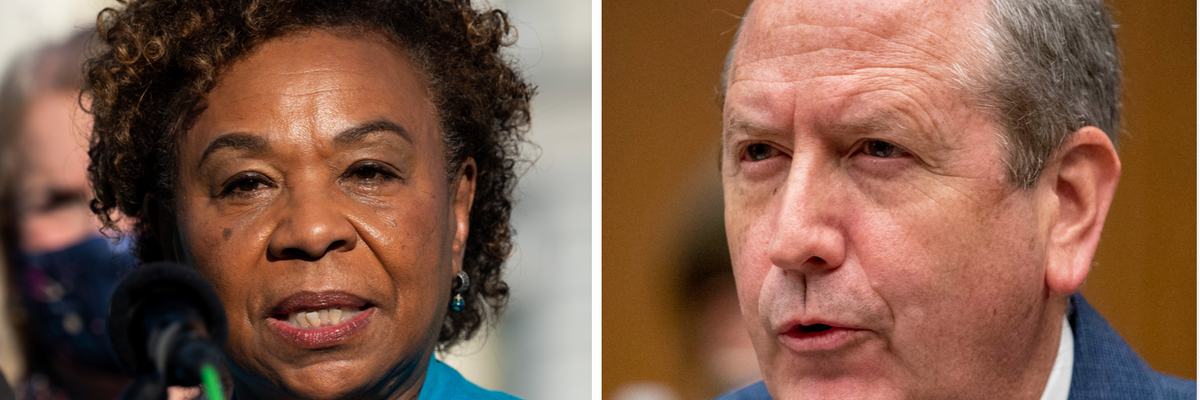UPDATE 7/14: The amendment to repeal the 2001 AUMF did not make if out of the rules committee this week, though House Rules Chairman Tom Cole said that Speaker Kevin McCarthy pledged to take up AUMF repeal legislation later this year.
Lawmakers have in recent years had a renewed appetite to reclaim Congress’s warmaking power. The Senate voted earlier this year to repeal the Iraq War authorizations from 1991 and 2002. The House has passed similar legislation in previous legislative sessions and President Joe Biden had pledged to support a repeal of the 2002 legislation, though those attempts have not yet become law.
There have also been efforts to end U.S. military participation in specific conflicts, including War Powers Resolutions targeting U.S. support for the Saudi-led war on Yemen in 2019 and efforts to withdraw forces from Syria and Somalia.
Now, Rep. Dan Bishop (R-N.C.) is leading a bipartisan group of House members in introducing an amendment to the 2023 National Defense Authorization Act that would repeal the 2001 Authorization for Use of Military Force.
The amendment, one of more than 1,500 that will be considered by the House Rules committee this week, would repeal the 2001 law 180 days after it is enacted.
The 2001 AUMF, which was passed by a vote of 420-1 in the aftermath of the 9/11 attacks, gave the president broad authorization to wage war “against those nations, organizations, or persons he determines planned, authorized, committed, or aided the terrorist attacks that occurred on September 11, 2001, or harbored such organizations or persons.” In the more than two decades since its passage, it has been used by four presidents, from both parties, to justify counterterrorism operations in at least 19 countries.
This law is “one of those things that's most inexplicable and abusive in terms of the way power and decision making is supposed to flow on matters of use of the military,” Rep. Bishop told Responsible Statecraft in an interview. “It is inconsistent with the notion that Congress declares war.”
Rep. Barbara Lee, the lone “nay” vote in 2001, is the lead Democratic co-sponsor for the amendment. She has introduced legislation aimed at repealing the 2001 law every year since 2010. “In just 60 words, the 2001 AUMF gave the President a blank check for war," Rep. Lee told RS in a statement. "In the decades since, it has been used as justification for open-ended military operations abroad. Make no mistake: the 2001 AUMF was wrong back then, and it’s wrong today. Congress must put partisanship aside and restore our constitutional war powers, starting by supporting this bipartisan amendment with Rep. Bishop.”
Other co-sponsors for this amendment include Reps. Andy Biggs (R-Ariz.), Eli Crane (R-Ariz.), Ken Buck (R-Colo.), Matt Gaetz (R-Fla.), Jan Schakowsky (D-Ill.), and Val Hoyle (D-Ore.).
Notably, when the Senate voted to repeal the two Iraq war authorizations, an amendment introduced by Sen. Rand Paul (R-Ky.) that would have repealed the post-9/11 legislation was overwhelmingly defeated by a vote of 86-9. In advance of that vote, Paul argued that repealing only the Iraq War authorizations would not go far enough.
“We need to take the additional step of also repealing the Authorization for the war in Afghanistan,” he wrote in Responsible Statecraft. “The 2001 authorization to bring the 9/11 terrorists to justice was warranted, but like the Iraq War, the Afghan War has long ago ended — yet its authorization remains on the books.”
Sen. Paul again introduced similar legislation in the Senate last month. “If there exists any desire to reclaim our Constitutional power and send a message to the world that we are a nation of peace, Congress should pass this bill and repeal the 2001 Authorization for war, Paul said in a June statement. After all, the 2001 AUMF never intended to authorize worldwide war, all the time, everywhere, forever.”
Rep. Bishop tells RS, “those in favor of forever wars are in both parties. My observation, in the time I’ve been in Congress, is that they tend to dominate.” Nonetheless, Bishop feels that the momentum is shifting towards opposition to these open-ended foreign entanglement, arguing that “the American people are so fed up with being involved in constant warfare.”
The amendment will be considered by the rules committee, which decides which amendments will receive votes on the floor, a process that started on Tuesday. If it makes it out of the rules committee, the amendment will have to be approved by both the House and the Senate. If past attempts at a repeal are any indication, this amendment may be facing long odds.
But those who want Congress to reclaim its constitutional responsibility as the sole body responsible for making decisions of war and peace will continue to push for the twenty-year old authorization to be overturned. “I do think that the number of times this [type of question] surfaces [in Congress] increases the prospect of ultimately dealing with it,” says Bishop.














